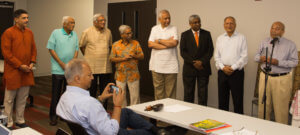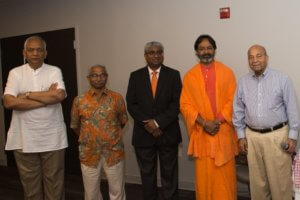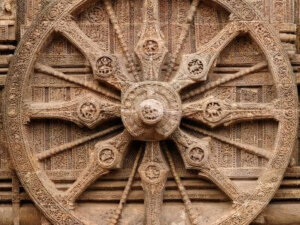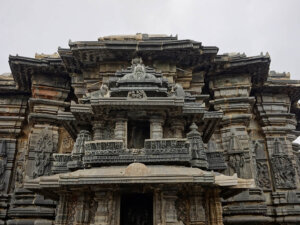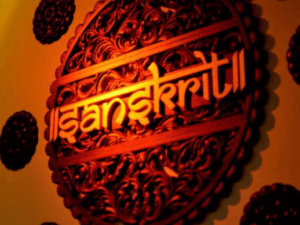Description
Master of Arts in Hindu Studies
Program Code:
MAH
Course Codes:
5000 – 6000
Credit Hours:
36 Semester Credit Hours
Duration:
2 years (full time)

Program Description
The Master of Arts in Hindu Studies program unfolds Hinduism across three main dimensions: the lived, cultural traditions; primary textual sources; and varied spiritual practices. When a student recognizes and appreciates the congruity and coherence of these three dimensions, across its varied and diverse expressions, this constitutes a sound foundational understanding of Hinduism. The program will develop the contrast between the Western paradigm of understanding of Hinduism which exhibits a propensity to describe Hinduism as inherently incoherent and contradictory, or hierarchical and oppressive, with the self-understanding of the Hindu civilization, based on its own texts, traditions, cultural expressions and spiritual practices.
Students must take 4 courses from the Hindu Studies Foundations program. The remaining 8 courses are spread across several distribution areas for a total of 12 courses, or 36 semester credit hours.
Program Learning Outcomes
Through the Master of Arts in Hindu Studies program, students will be able to:
- Articulate a comprehensive understanding of Hinduism.
- Communicate the coherence and continuity inherent in Hinduism’s diverse expressions.
- Demonstrate a basic knowledge of Orientalist and Indological scholarship on Hinduism.
- Analyze the impact of Western thought on the representation of Hinduism.
- Examine contemporary challenges through a Hindu dharmic lens.
Video Testimonial

Who is this Program for?
This program is for people who are interested in acquiring a sound foundational understanding of Hinduism in a formal academic setting, from the perspective of an insider to Hinduism i.e., a practitioner or a committed scholar. It will be invaluable for people who wish to contribute academically, write scholarly articles and papers, publish books and participate in presenting a Hindu perspective on the world stage.
It also serves as a foundation for those interested in pursuing a professional doctorate in Hindu Studies or a Doctor of Philosophy Degree in Hindu Studies. For people who were not born in the Hindu tradition but have been drawn to its teachings, this program will provide an excellent academic foundation.
How long will this program take?
A full-time course load is considered 3 courses per semester. At this rate, a student can complete the Master’s degree in 4 semesters (2 years), depending on the Independent Practice Study and the completion of a Master’s Thesis.
A reasonable course load that is suited for full-time working professionals is 1-2 courses per semester. At this rate, the MA can be completed in 6 – 12 semesters (3-6 years).
Prerequisites for the Program:
Any student who has already completed a Bachelor’s Degree in any discipline is eligible to apply for this Program. No prior knowledge of Hinduism or Sanskrit language is required. However, students must complete the “Orientation to Hindu Studies” Course offered by HUA successfully, before their application for the Master of Arts in Hindu Studies Program will be considered.
Master of Arts in Hindu Studies
Structure of the Program
The Master’s program consists of a total of 36 credit hours of coursework.
Hindu Studies Foundations (Required to complete 1 course from each section below)
- Bhagavad Gita
- Vedanta
Academic Preparation (2 Courses)
Field Based Learning
Texts and Traditions (1 Course)
- TAT7201 – Mahabharata I – The Beginning and End
- TAT7204 – Mahabharata IV – Dharma and Darshana
- TAT7301 – The Bhagavata Purana
- Any course based on Hindu Texts, from any of the other Areas of Study may be taken here.
Yoga Studies (1 Course)
- HSF6003 – Yoga Darshana
- HSF6004 – Sankhya Darshana
- HSF6005 – The Yoga Sutras of Patanjali
Hinduism & the West (Any 2 Courses)
- Colonialism / Postcolonialism
- HSF6001 – Foundations of Hindu Culture
- History of Ideas / Western thought
Applications of Hindu Thought (1 Course)
- Conflict & Peace Studies
Field Based Learning (FBL)
The Master of Arts in Hindu Studies program seeks to engage students in multiple modes and sites of learning, incorporating them into the framework of authentic study of Hinduism. Field based learning is recognized as particularly valuable for students enrolled in distance learning institutions like HUA. The Field based Learning Course (FBL) encourages students to co-create an individualized experience of inquiry and self-inquiry in the field of Dharmic institutions outside of HUA.
The FBL is designed to provide students with rich opportunities to:
- Observe and immerse in the practice and expression of knowledge in a Dharmic learning environment.
- Acquire an enhanced understanding of the lived, cultural traditions, primary textual sources, and varied spiritual practices of Hinduism from experts and gurus.
- Make connections between their HUA coursework and their field study.
- Reconnect or make stronger connections with their personal ancestral lineage.
HUA respects the commitments students have outside of their studies. The FBL is tailored to meet each student’s needs and goals. HUA also recognizes that the success of field study depends upon a high degree of definition and planning. Each student will work with their advisor to develop their FBL Plan.
The Field Based Learning course must be structured within a formal relationship with a Dharmic institution outside of HUA, and must meet the following criteria:
- The institution is connected to a specific sampradaya. For example, an FBL on yoga cannot be completed at a Westernized yoga school with no specific Dharmic lineage.
- There is an on-site learning component. This can take place at any time during the course of study. The duration should be both amenable to the student and recommended or approved by the partnering institution. Students will take field notes during this period.
- There is an extended component of learning apart from the on-site component. This might include online meetings or courses with an acharya (instructor) or guru from the institution; a deeper study of a text or practice that relates to the onsite experience. The aggregate of the two components should comprise a semester’s-worth of study.
- The study enhances the student’s understanding of Hinduism with both knowledge and practice. For instance, a student might incorporate a new practice of sadhana as a result of the FBL.
- The student is able to make connections between their FBL, their HUA coursework, and their personal practice of Hinduism. This connection does not have to include all of their coursework; it can be a deeper dive into a particular node of study.
Students will write a final paper as a culmination of the FBL. The paper will incorporate their field notes, their extended learning, and (an aspect of) their HUA coursework.
Master’s Thesis
Those who successfully complete the thesis will receive an MA (with Honors) in Hindu Studies. If a student does not plan on pursuing a degree past the Masters (i.e., it is a terminal degree), the MA Thesis is entirely optional. For students who plan on pursuing a higher degree outside of the Hindu University of America in the field of Hindu Studies, the MA Thesis is recommended, as it will strengthen one’s application package. For students who are going to pursue their Doctorate in Hindu Studies (DHS) at the Hindu University of America, the MA Thesis is required.
To complete the Master of Arts in Hindu Studies Program, with the thesis option, the students must submit an MA Thesis and present the thesis at HUA’s annual Graduate Student Conference. It is advisable for students to begin thinking about possible topics for their thesis by the end of their first semester of study (for full-time students). Students will work with their advisors to finalize their thesis topic and successfully complete their thesis.
The Master’s Thesis must meet the following four criteria:
- Single-authored, original academic writing that demonstrates familiarity with previous work in the topic and the ability to pursue a line of inquiry through research, organize results, and articulate arguments and conclusions in a scholarly manner.
- Writing must be at or above the level of Accomplished in HUA’s Graduate Student Writing Rubric across all five domains. (Link to Writing Rubric)
- The thesis must demonstrate 3-5 of the Programmatic Learning Outcomes.
- All activities involved in the development and writing of the thesis must be conducted with the highest level of honesty, integrity, and respect towards research subjects and topics, colleagues, and peers.
The thesis paper need not need be bound for journal submission, but it must be academic writing. Blogposts, journalistic articles, and other non-academic writing cannot be submitted as a Master’s Thesis. For example, students may choose to
- Further develop a paper they have already written for a class at HUA.
- Research and write a new paper.
- Write an academic book review.
- Develop a literature review on a topic of interest.
For thesis writing guidelines, please consult your Graduate student Advisor.
Program Context:
The Master of Arts in Hindu Studies prepares students for service, leadership, and global engagement, in fostering the spiritual and intellectual paradigm of Hindu dharma. Immersing students in critical inquiry, ethics, and self-reflection, it enables the student to evaluate and discover knowledge systems based in Hindu thought, at the intersection of philosophy, theology, religion, tradition, spirituality, and science from the standpoint of their contemporary relevance, both for the global Hindu community, as well as for humanity in general.
It critically inquires into the truth claims, dimensions, and development of Hindu thought, society, culture, and civilization and examines historical and contemporary narratives about them in an atmosphere of academic excellence and freedom. It empowers students to immerse themselves into the Hindu paradigm and cosmology, reflect on the human condition from a Hindu context, to plan and develop strategies for the preservation and transmission of Hindu thought and contribute its unique value, addressing seemingly intractable challenges facing humanity, in a language and metaphor that is at once, timeless and contemporary.
The realms of Dharma and Moksha, Jnana and Yoga are the unique dimensions of Hindu thought. These dimensions take us beyond the domain of material success, wealth, status, influence, and power in the temporal world. They take us into a deeper dimension of human possibility i.e., the spiritual or the Adhyatmika realm. In each of us lies dormant a need and a desire for deeper engagement with the world, to converse and communicate, (Samvada), to contribute, to make a difference and be of service in a profound and meaningful way.
In each of us lies as yet unfulfilled the potential for leadership and global impact, sometimes even as yet unimagined. In every one of us without exception there lies the possibility of going within, exploring the realms of deeper levels of consciousness, and transforming our connection and relationship with the cosmos itself. Hindu thought carries within it the seeds of a greater possibility, of a deeper fulfillment and connection with the cosmos, a more profound self-expression, contribution, and service to humanity.
The MA Program in Hindu Studies is an adventure, at once both intellectual and deeply spiritual, a thoughtful reflection on the human condition and history, and a journey of profound personal transformation.
X
Master of Arts in Hindu Studies
The tuition fee per credit hour for Graduate School courses is $ 500. The total cost of the MA Program with 36 semester credit hours is $ 18,000. However, students have the option of signing up for annual payment plans that will reduce the cost.
The following payment plans are available:
Pay in Full: $ 14,400 one-time payment. Saving of $ 3,600.
- 2-Year Payment Plan:$ 7,500 per year, total of $ 15,000 Saving of $ 3000.
- 3-Year Payment Plan:$ 5,400 per year, total of $ 16,200. Saving of $ 1800.
- 4-Year Payment Plan:$ 4,200 per year, total of $ 16,800. Saving of $ 1200.
- 5-Year Payment Plan:$ 3,500 per year, total of $ 17,500. Saving of $ 500.
- Pay Per Semester:$ 1,500 per Course, total of $ 18,000. Full Price.
- Pay-Per-Month:$ 320 per month, total of $ 19,200
There is also a one-time administration fee of $100 to be paid initially at the time of enrollment in the program.
From: $320.00 / month for 60 months and a $100.00 sign-up fee
Before you choose a payment plan, and get enrolled in the Masters of Arts in Hindu Studies program, please make sure that you have completed the following steps.
- Applied for the Program.
- Received a letter of acceptance from the admissions office.
- Reviewed the enrollment agreement form.
- Determined your payment plan.
After all of the above steps have been completed, please choose a payment plan below and pay your fees.
X
Tuition and Payment
The tuition fee per credit hour for Graduate School courses is $ 500. The total cost of the MA Program with 36 semester credit hours is $ 18,000. However, students have the option of signing up for annual payment plans that will reduce the cost.
The following payment plans are available:
Pay in Full: $ 14,400 one-time payment. Saving of $ 3,600.
- 2-Year Payment Plan:$ 7,500 per year, total of $ 15,000 Saving of $ 3000.
- 3-Year Payment Plan:$ 5,400 per year, total of $ 16,200. Saving of $ 1800.
- 4-Year Payment Plan:$ 4,200 per year, total of $ 16,800. Saving of $ 1200.
- 5-Year Payment Plan:$ 3,500 per year, total of $ 17,500. Saving of $ 500.
- Pay-as-you-go:$ 1,500 per Course, total of $ 18,000. Full Price.
- Pay-per-month:$ 320 per month, total of $ 19,200
There is also a one-time administration fee of $100 to be paid initially at the time of enrollment in the program.
X
FBL Examples
Example # 1:
Priya (a hypothetical student) is interested in learning more about her family’s ancestral lineage and in enhancing her knowledge and practice of yoga in India. She lives in the United States and is the mother of a young child, so she will not be able to stay at a Yoga Gurukulam for an extended period of time. Priya has located a particular site for her FBL, which meets the criteria. They understand her responsibilities and have told her that a one or two-week stay at the Gurukulam is sufficient; she is able to manage this. She will participate in online courses with the Gurukulam, before and after her stay and is already thinking about how she can make connections with her HUA coursework in Yoga Sutras of Patanjali and other Yoga related courses.
Example # 2:
Kevin (a hypothetical student) is a musician who has been drawn to the spiritual foundations of Bhakti music. He lives in the USA, and is part of a Performing Arts Orchestra, who has been dabbling with his own musical creations based on the Vedic teachings. He is able to visit India for an extended period of time, and designs a 3-month immersion experience for his FBL with a Partner institution in India, which specializes in Classical Indian Music. He is also simultaneously learning Sanskrit through HUA and will be working on developing a deeper appreciation of the lyrics and their meanings from within a Hindu spiritual context. He will be making connections between his HUA coursework on Sanskrit as well as in Hindu Philosophy with the compositions of the Bhakti saints of various genres through his FBL.
Example #3:
Darshana (a hypothetical student) is interested in understanding the Ashram experience more fully. She is able to spend a substantial amount of time at an Ashram in the United States. She combines that experience with a quick 3-week Ashram tour of India to Rishikesh, Coimbatore and Belur, where she is able to develop an immersive understanding of the Ashram experience across multiple Hindu traditions. Her FBL is managed through the relationship with the Ashram in the USA and is able to also incorporate the 3-week travel to India to visit and experience several Ashrams. Through these varied Ashram experiences, she is able to incorporate new practices in her own life, after experimenting briefly with multiple practices being offered at these various sites.







